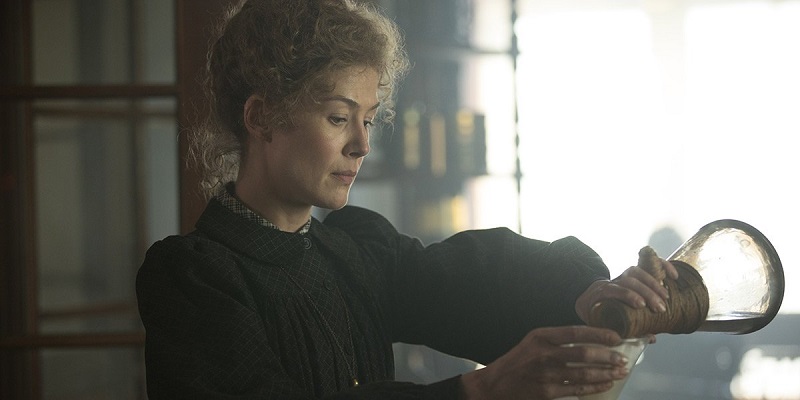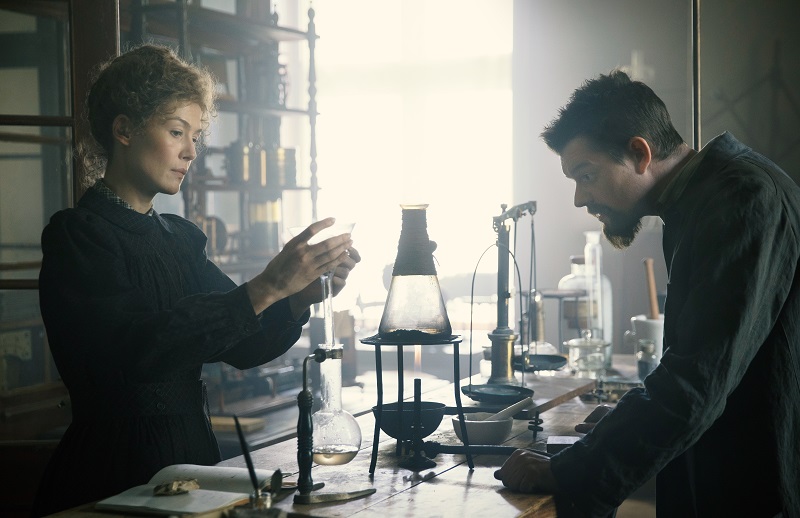Rosamund Pike is a revelation as Marie Sklodowska in the new biopic, Radioactive. Who? The world knows her better with her married name, Marie Curie, who with her husband Pierre, discovered a few elements—Radium among them—and changed the course of history, science, and medicine.

What Radioactive does well is showcase how the Curies came to their revolutionary scientific achievements and specifically how those discoveries ultimately cost them their lives. Now, specifically, Pierre Curie perished in an accident. His wife believes that the effects of being exposed to radioactivity—something they also “discovered”—prevented him from being of sound mind and thus was unable to avoid the horse-drawn carriage that dragged him to his death. He was already sick, and even coughing up blood, something veteran movie appreciators know is a death knell for any character!
Sam Riley (probably best known for playing Angelina Jolie’s “sidekick” in those Maleficent movies) is Pierre and he too is mesmerizing in the role. Their romance is handled beautifully and a salute to their passion, both for science and for each other. Lucky for them, they got to work together, few couples ever get that opportunity. It wasn’t his fault, but there was friction and resentment in the marriage that was caused when they were awarded the Nobel Prize. Only his name was placed on the award. Women weren’t recognized by the organization, reflecting the sentiment of the society as a whole during that time.
That aspect of Curie’s story is not necessarily portrayed in the most cinematic of manners. The struggle that Madame Curie undertook every single day, instead of challenging her to her core, comes off as flat and is a bit of a disservice to her extraordinary perseverance that was required of any woman seeking to be taken as seriously as a male, particularly in a male-dominated landscape that is and was science. It drags and is muddled.
Jack Thorne’s script (based on the book by Lauren Redniss) missed an opportunity to showcase specifically the walls that Marie kept running into as she revolutionized her field. Sure, viewers experience them, but the emotive power that is elicited by these scenes is wholeheartedly flat. In fact, many modern women speak to being seen or called the “B” word when they fight for what’s rightfully theirs in the workplace. U.S. House of Representatives Alexandria Ocasio-Cortez is currently making headlines currently for being called that word by a fellow “Congressman” because of her trailblazing hard work for her constituents and Americans everywhere. Her fight in 2020 is real, as it was over a century ago for Marie Curie. The problem with Radioactive is that instead of constructing a dramatic landscape that illustrates her frustrations with the system, Thorne’s script features her demanding what’s rightfully hers in a manner that sadly comes off as cold, calculated, and finds her portrayed as overly demanding. I’m sure that was not the intent, but sadly that’s how it plays.

Pike can do no wrong. Can you imagine anyone else portraying the title character in Gone Girl? The same can be said for Radioactive. She does as much as she can with the script she’s given and is utterly electric as the legendary pioneer. It’s just that the story, the film overall, fails her. There is an entire section of the film that chronicles her personal life after the death of her husband and how that (further) hindered her quest to be taken seriously and to push the envelope of science. There was a scandal and it reminded me of how salacious news is always a substitute for a substantive discussion about an issue. Instead, the scandal serves as a distraction from the real issue at hand. The same thing can be said for how filmmakers handled Curie’s struggle to be taken seriously and more importantly, to be seen as an equal as her husband. Maybe even, be portrayed as someone who was even more intelligent than Mister Curie.
Another narrative decision that drags down the powerful potential of the real-life story is how director Marjane Satrapi frequently takes viewers into the future to physically show the effects of the Curies and their discovery. It is unnecessary and further clouds the forward momentum of this important biopic. What’s worse, is it almost gives us the impression that the fault of these modern moments, the blame if you will, lies at the feet of Marie Curie and her husband. Look, she didn’t take the discovery of radium and turn it into an atom bomb. But there we are in the cockpit of the Enola Gay as it prepares to drop the nuclear bomb on Japan. It wasn’t the Curies who cut corners and made faulty decisions that led to the meltdown at Chernobyl. Yet, there we are in the Soviet Union as countless souls suffer from radioactivity poisoning. For a film that needed streamlining, these extracurricular aspects of the storytelling did a gross disservice to the Curies and their legacy. Now, to be fair, there is one “flash-forward” where a child’s cancer is eradicated in 1957 through chemo. But that isn’t necessarily on the Curies either. It’s like a Pandora’s Box, but audiences know enough about history to draw their own conclusions. We didn’t need to be force-fed that aspect of their discovery.

It is too quickly moved through, but something tangible that the Curies did is shown and that is how Marie’s X-Ray machines were loaded onto ambulances and taken to the front lines of World War I, saving countless lives and an immeasurable number of limbs that would have otherwise been amputated. She undergoes that harrowing mission with her daughter Irène (played by the always awesome Anya Taylor-Joy of Emma fame) and filmmakers do a decent job of showing how the Curie’s oldest daughter followed in her parents’ footsteps.
One of my pet peeves in the movie business is biopics that get it wrong. No one is ever remaking a biopic. You usually get one shot to get it right and that’s it. Hopefully, enough people will see Radioactive and walk away with a further enhanced opinion of the Curies, particularly Marie. What she did, given those walls that were in her way, is astounding. Pike is powerful, and so too is Taylor-Joy and Riley. It’s just that they can only do so much with what they’re given.
Grade: B-

